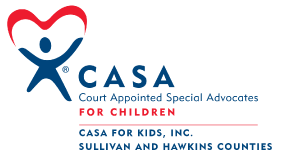Frequently Asked Questions
- What is a CASA Volunteer?
- Who can be a CASA Volunteer?
- How much time does volunteering require?
- Why is the CASA program important?
- What training and support do volunteers receive?
- Why do CASA programs need money to operate when volunteers are not paid?
- How are CASA programs funded?
- Is it Dangerous?
- How available does someone have to be to be a CASA?
- Will this break my heart?
- Will I get reimbursed for mileage or other expenses?
- How do I apply to become a CASA?
- Are there other ways to help CASA besides being a CASA?
-
What is a CASA Volunteer?
A CASA Volunteer is a trained community volunteer appointed by the juvenile court judge to be an independent voice in court for a child or youth who has experienced abuse or neglect. A CASA Volunteer advocates for any needed services and a decision that considers the child’s sense of time.
-
Who can be a CASA Volunteer?
CASAs are ordinary citizens, must be at least 21 years of age or older and successfully complete a background check. No special or legal background is required. However, volunteers are screened closely for objectivity, competence, and commitment.
-
How much time does volunteering require?
Each case will be different. A CASA Volunteer spends a minimum of 15 – 20+ hours doing research, conducting interviews, and writing a court report during the first 4 – 6 weeks of a new case. Once the CASA prepares their initial report and appears for the first hearing, the CASA could spend 2 – 4 hours per month on a case.
-
Why is the CASA program important?
While other child advocacy organizations exist, Court Appointed Special Advocates is the only program where volunteers are appointed by the court to represent a child’s best interest.
-
What training and support do volunteers receive?
CASA Volunteers are trained by Professional Staff, certified to facilitate the National CASA curriculum. Our program currently offers two modalities of training. First, Self-Guided, in which trainees meet weekly with the training facilitator to review material, provide explanation, further instruction and answer questions. Second, in-person training which consists of 35 hours of instruction on topics ranging from the well-being of a child to how to write a court report. Additionally, a minimum of 2 hours of court observation is required. Trainees are paired with a CASA Mentor, a seasoned CASA, to observe and demonstrate what they learn in training. The culmination of the initial training is the swearing-in ceremony with the Juvenile Court Judge. Once sworn in as a CASA Volunteer, Professional Staff provide guidance and supervision.
-
Why do CASA programs need money to operate when volunteers are not paid?
In order to provide the service CASA does, programs must hire staff to manage the program and supervise volunteers. Program expenses include occupancy/rent, salaries, office support, computers, equipment, travel and training. CASA program staff recruits, trains and supervises volunteers to ensure quality services. National CASA and Tennessee CASA has program standards that all CASA programs are required to follow and are evaluated for compliance.
-
How are CASA programs funded?
CASA programs are locally supported. United Ways, fundraising events, annual giving, foundation and state grants provide a basic foundation of support. National CASA/GAL also provides grants to help start or expand programs. CASA programs depend on their communities to support the service.
-
Is it Dangerous?
Our CASA Volunteer’s safety is always the utmost importance! Since our beginning in 1991, there have not been any incidents of a volunteer being harmed. The continued safety of our CASA Volunteers is a priority. It is never mandatory for a CASA to enter a home, neighborhood, or meeting if they feel uncomfortable. If a situation should ever arise where a CASA does not feel safe, the Case Supervisor will assist in making alternate arrangements.
-
How available does someone have to be to be a CASA?
We ask for a one-year commitment of CASA Volunteers. All CASAs are required to see their child at the very minimum of once per month after the initial court hearing. Prior to that, a CASA may see the child(ren) several times. This is to help build rapport with the child(ren). If there is no alternative to being able to stay through the duration of a case, Program Staff will assign another CASA as quickly as possible. This must be handled with care to make sure the child(ren) or youth understand they are not being abandoned. Many children CASA sees have experienced trauma in some form and must be handled with care in order to minimize further trauma exposure.
-
Will this break my heart?
This work can be emotional, but many volunteers comment that the rewards of making a difference in a child’s life outweigh the emotionally challenging work volunteering can present.
-
Will I get reimbursed for mileage or other expenses?
Many volunteers track their mileage and other expenses (phone calls, postage) and use it as a tax write-off at year end. As a nonprofit organization, CASA for Kids, Inc. is not able to reimburse volunteers for these expenses.
-
How do I apply to become a CASA?
The fastest way is to apply online. Your application will be emailed to CASA for Kids, Inc. when you click “submit”.
-
Are there other ways to help CASA besides being a CASA?
Yes! Being a CASA Advocate is not possible for everyone. We rely on donations, corporate sponsorships, attendance at fundraisers – like our CASA Red Shoe Gala, Golf Tournament or Low Country Boil . At varying times, we need office and special event volunteers as well. Our CASA Ambassadors help to spread the word about CASA!
Do you have a question that we missed? Please contact us.
